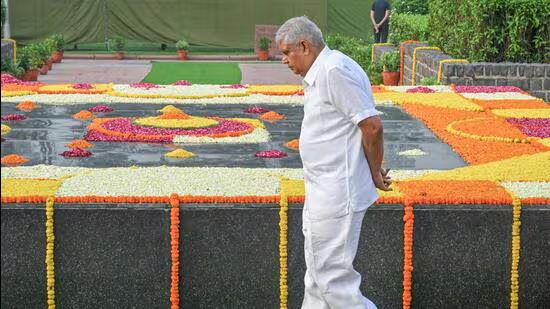
Jagdeep Dhankhar
Jagdeep Dhankhar, the 14th Vice-President of India, tendered his resignation on July 21, 2025—an unprecedented mid‑term exit that has sent ripples through the nation’s political landscape. Officially, Dhankhar cited health concerns and medical advice as the sole motivators behind his decision. However, the abruptness of his resignation—on the very first day of Parliament’s monsoon session—has ignited vigorous speculation and partisan debate. Here’s a detailed breakdown of what’s known, what’s being discussed, and what this means for India’s polity.
🩺 Official Reason: Health Comes First
In his resignation letter submitted under Article 67(a) of the Constitution, Dhankhar stated his need to “prioritise health care and follow medical advice.” He did not elaborate on his specific medical condition. His brother‑in‑law, advocate Praveen Balwada, reinforced this explanation, dismissing rumors of political pressure and confirming that health was indeed the primary reason.
⚖️ A Rare Constitutional Move
Dhankhar’s resignation is historic: no vice-president in India’s journey has ever left office before completing their term, highlighting the gravity of his choice. Serving under President Droupadi Murmu since August 2022, he was due to complete his term in 2027. Yet he stepped down after serving nearly three years, positioning him as the first-ever VP to resign mid-term.
🤔 Timing: Coincidence or Calculated?
His resignation on the opening day of the monsoon session attracted raised eyebrows. Critics, including Congress leader Jairam Ramesh, suggested “more than meets the eye,” hinting at undisclosed motives Manish Tewari, another opposition figure, also expressed suspicion over the timing and lack of prior indication, suggesting political undertones Omni.
🗳️ Opposition’s Prior Moves: Notice Controversy
In December 2024, a historic move emerged in Parliament: nearly 60 opposition MPs filed a no‑confidence motion against Dhankhar in his role as Rajya Sabha Chairman, accusing him of partiality and silencing dissent Though unprecedented, the motion was dismissed on technical grounds, including procedural flaws like incorrectly spelling his name and failing to provide the mandatory 14 days’ notice .
Dhankhar dismissed the motion as a politically motivated, publicity-seeking stunt, and the ruling NDA rallied behind him. Still, the episode left lingering doubts about his standing with both sides in the House.
🏛️ Judicial Impeachment Debate: A Thorny Backdrop
Adding to the complexity, Dhankhar recently invoked Article 121 of the Constitution to block discussions on the impeachment of a high court judge during a Rajya Sabha session, drawing opposition ire. The heated exchange highlighted the tensions layered beneath the constitutional and judicial dynamics he navigated as Chairman.
📜 Dhankhar’s Perspective and Legacy
During his tenure, Dhankhar was no stranger to controversy. As Governor of West Bengal (2019–2022), he engaged in public clashes with Chief Minister Mamata Banerjee—marked by fiery exchanges and Twitter feuds. His time as Vice-President and Rajya Sabha Chairman saw him assert his authority vigorously, including strong critiques of judicial overreach—attacking the Supreme Court’s basic-structure doctrine and judicial activation as “unchecked power” .
Yet Dhankhar also championed constitutional processes. He expanded women’s representation in Vice‑Chairperson roles during key legislative debates and asserted Parliament’s role in judicial impeachment procedures .
🔍 Political Implications and What’s Next
- Immediate Procedural Actions
With the VP seat vacant, the Election Commission must initiate the vice-presidential election promptly under constitutional mandate. A new race is expected to quickly follow - Parliamentary Dynamics
Dhankhar’s exit alters the Rajya Sabha balance. His assertive chairmanship and visible presence will be missed, while his departure may ease tensions or escalate factional jockeying, depending on his successor. - Opposition Satisfaction?
For the Opposition, the resignation might appear vindicatory—a key force behind both the impeachment push and judiciary-related conflicts. Opposition leaders may see validation in his mid-term departure, even if health is cited. - Ruling Party’s Dilemma
The BJP‑led government must now manage two fronts: natural Justice appointments and placating interest groups by nominating a vice-president who balances political loyalty, parliamentary temperament, and institutional diplomacy. The choice will set a tone for the remainder of the current Lok Sabha’s term.
🧭 Conclusion
Jagdeep Dhankhar’s exit as Vice‑President is a rare constitutional event catalyzed by health concerns—but layered with intricate political undercurrents. His resignation on the cusp of a critical session hints at deeper realignments within both Houses. As India prepares for an expedited vice-presidential election, the contest for his successor will carry substantial symbolic weight.
While health remains the official reason, the timing—and backdrop of past controversies, parliamentary disputes, and ongoing judicial debates—suggest that Dhankhar’s resignation also functions as a political inflection point. It raises enduring questions: Was this exit purely medical? Or an orchestrated pause in a larger political narrative? Only time—and the identity and conduct of his replacement—will offer definitive answers.
Thanks For Reading